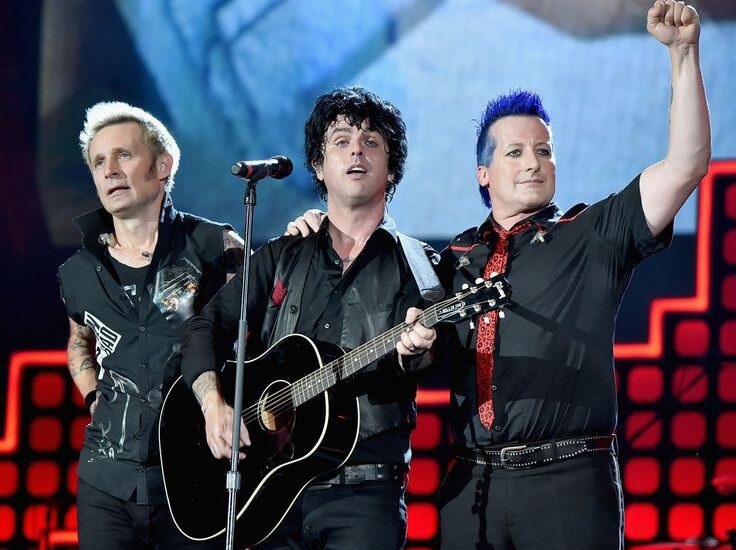
Artistic Visionary: Green Day stands as a true visionary in the world of music, a guitarist whose artistry knows no bounds……
Artistic Visionary: Green Day stands as a true visionary in the world of music, a guitarist whose artistry knows no bounds……
Green Day is more than just a band; they are a cultural phenomenon that has shaped the landscape of modern music. Emerging from the punk rock scene of the early 1990s, the band has consistently pushed boundaries, blending genres, and addressing social issues through their artistry. With a career spanning over three decades, Green Day’s impact on music, culture, and the punk genre itself is profound, making them one of the most influential bands of our time.
Origins and Rise to Fame
Green Day was formed in 1986 in Berkeley, California, by Billie Joe Armstrong (vocals, guitar) and Mike Dirnt (bass). They were soon joined by Tré Cool (drums), solidifying the lineup that would become iconic. Their early music, characterized by fast tempos, catchy melodies, and lyrics reflecting the frustrations of youth, resonated with a generation yearning for authenticity in a world rife with commercialism.
The band’s breakthrough album, “Dookie,” released in 1994, catapulted them to mainstream success. With hits like “Basket Case” and “When I Come Around,” “Dookie” not only sold millions of copies but also introduced punk rock to a broader audience. Green Day’s energetic performances and relatable themes spoke to the disillusionment of youth in the ’90s, marking them as leaders of the punk revival movement.
Evolution of Sound and Themes
As Green Day evolved, so did their sound. Following the success of “Dookie,” they released “Insomniac” (1995) and “Nimrod” (1997), both of which showcased a maturation in their songwriting and musical complexity. While still retaining their punk roots, these albums explored darker themes and more intricate arrangements.
In 2004, Green Day released “American Idiot,” a politically charged rock opera that solidified their status as cultural icons. Addressing the disillusionment with the American political landscape, the album features tracks like “American Idiot” and “Boulevard of Broken Dreams,” which resonated deeply during a tumultuous political climate. The album’s success was not just commercial; it also garnered critical acclaim, earning several Grammy Awards and eventually being adapted into a Broadway musical.
Artistic Vision and Influence
Green Day’s artistic vision extends beyond music. Their ability to blend personal narratives with broader social and political commentary has set them apart in the rock genre. Billie Joe Armstrong’s lyrics often reflect his own struggles, including issues of identity, mental health, and societal expectations. This authenticity creates a connection with fans, many of whom find solace and understanding in the band’s music.
Moreover, Green Day’s visual aesthetics, from album art to stage design, reinforce their artistic vision. The band has embraced a punk ethos not only in their sound but also in their imagery, creating a cohesive brand that resonates with their audience. Their concerts are high-energy events that engage fans emotionally and politically, further solidifying their impact on the punk and rock landscapes.
Legacy and Cultural Impact
Green Day’s legacy is marked by their ability to influence not just music, but also the cultural zeitgeist. They have inspired countless musicians and bands, demonstrating that punk rock can be both commercially successful and artistically relevant. Their fearless approach to addressing taboo subjects in their music encourages other artists to explore difficult themes.
Furthermore, their commitment to activism, particularly in areas such as LGBTQ+ rights and anti-war movements, has established them as advocates for social change. The band’s involvement in various charitable initiatives and campaigns underscores their belief in using their platform for good, making them role models for both fans and aspiring musicians.
Challenges and Resilience
Despite their success, Green Day has faced challenges, including personal struggles and changes in the music industry. Billie Joe Armstrong’s battle with addiction, publicly acknowledged in the early 2010s, was a significant turning point for the band. Their ability to confront these issues openly has humanized them, allowing fans to relate to their vulnerabilities.
The band’s resilience is also evident in their adaptability. As the music industry evolved with the rise of digital platforms and changing consumer habits, Green Day navigated these shifts while maintaining their core identity. Their willingness to experiment with sound, as seen in albums like “¡Uno!,” “¡Dos!,” and “¡Tré!,” reflects their commitment to innovation while staying true to their roots.
You may also like
Archives
Categories
- ABA
- Actor
- Actress
- Actress and singer
- Band
- Baseball
- Basketball
- Boxer
- Broadcasting corporation
- CCR
- cricketer
- Cyclists
- Dart
- Drummer
- Fictional character
- Football game
- Formula 1
- Golf
- Guitarist and songwriter
- Guitarists
- Gymnastics
- Hockey
- Ice hockey
- Marathon
- MLB
- Motocross
- MotoGP
- Motorcross
- Musician
- Musician and drummer
- NFL
- NHL
- NRL
- Racer
- Red bull Racing
- Rider
- Rock band
- Rugby league
- Simone Biles
- Singer and songwriter
- Songwriter and musician
- Sport commentator
- Tennis
- Texas longhorns
- Track and field athlete
- Uncategorized
Leave a Reply